|
|
|
Sort Order |
|
|
|
Items / Page
|
|
|
|
|
|
|
| Srl | Item |
| 1 |
ID:
185161
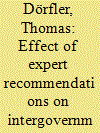

|
|
|
|
|
| Summary/Abstract |
The article explores whether and to what extent expert recommendations affect decision-making within the Security Council and its North Korea and Iran sanctions regimes. The article first develops a rationalist theoretical argument to show why making many second-stage decisions, such as determining lists of items under export restrictions, subjects Security Council members to repeating coordination situations. Expert recommendations may provide focal point solutions to coordination problems, even when interests diverge and preferences remain stable. Empirically, the article first explores whether expert recommendations affected decision-making on commodity sanctions imposed on North Korea. Council members heavily relied on recommended export trigger lists as focal points, solving a divisive conflict among great powers. Second, the article explores whether expert recommendations affected the designation of sanctions violators in the Iran sanctions regime. Council members designated individuals and entities following expert recommendations as focal points, despite conflicting interests among great powers. The article concludes that expert recommendations are an additional means of influence in Security Council decision-making and seem relevant for second-stage decision-making among great powers in other international organisations.
|
|
|
|
|
|
|
|
|
|
|
|
|
|
|
|
| 2 |
ID:
185157


|
|
|
|
|
| Summary/Abstract |
How does sanction type negatively impact women in gendered ways in the target state? I argue that economic sanctions place a financial burden on the target state which leads to government cuts to social spending, specifically in public education. Women rely disproportionately upon spending on public education, and thus, are impacted more harshly than men when these programs are underfunded by the government. I find that contrary to policy expectations, targeted sanctions do not have a reduced impact on women’s human rights in the target state compared to comprehensive sanctions once this impact is disaggregated from standard human rights indices and specific mechanisms in the state are examined. In fact, compared to comprehensive sanctions, I find that targeted and human rights sanction types are worse for women’s gender equality metrics via this influence on government social spending. Using a panel analysis, I show that targeted and human rights sanctions lead to a decrease in government spending on public education and that these cuts negatively impact women in the post-sanctions period. However, I illustrate that when the target state increases spending on primary education in the post-sanctions period, the overall negative impact of sanctions on women can be mitigated.
|
|
|
|
|
|
|
|
|
|
|
|
|
|
|
|
| 3 |
ID:
185164
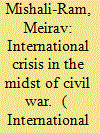

|
|
|
|
|
| Summary/Abstract |
This article examines the nexus between international crises and civil wars. Based on the premise that not all simultaneous civil and international conflicts are related, the study aims to explore the circumstances in which civil wars affect violent escalation in international crises. The study identifies ‘composite’ crises – where the civil war is the core issue of the international dispute – as a unique subset of international crises. These crises are distinguished from ‘unrelated-civil war’ situations, in which the issues in the internal and international conflicts are separate. Using data from the ICB, COW, and UCDP/PRIO datasets, the article tests a dual-conflict argument, positing that interconnected issues and interactions between actors in composite situations inhibit moderate crisis management and aggravate interstate behavior. The findings show that while civil war in composite situations has a negative impact on crisis escalation, unrelated-civil war has an inverse impact on interstate relations in crisis.
|
|
|
|
|
|
|
|
|
|
|
|
|
|
|
|
| 4 |
ID:
185163


|
|
|
|
|
| Summary/Abstract |
In spite of a vibrant debate about the genesis, logic and effects of peace operations, peace research remains poorly equipped to account for how policies are implemented and ‘translated into practice’ – issues that have been the focus in implementation studies for nearly five decades. In response, we propose a merger of certain strands of peace research with bottom-up implementation studies, which forefronts the role of ‘implementing actors’, namely, those actors who are granted the discretionary powers to carry out policies in their daily encounter with local counterparts on the ground. Through a case study of peace operations in the Democratic Republic of the Congo (DRC), we show that successful policy implementation depends on that field-based implementing actors are provided with discretionary powers to use their skill, judgement and local knowledge to solve problems and ensure implementation of peace operations on the ground. There is a need for a paradigm change within peace research in order to account for these findings. Better understanding of the daily work carried out by implementing actors in the field makes it possible to avoid many of the pitfalls and shortcomings we have witnessed through several decades of flawed or even devastating peace operations such as the one in DRC.
|
|
|
|
|
|
|
|
|
|
|
|
|
|
|
|
| 5 |
ID:
185158
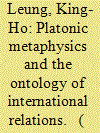

|
|
|
|
|
| Summary/Abstract |
This article offers a reading of Plato in light of the recent debates concerning the unique ‘ontology’ of International Relations (IR) as an academic discipline. In particular, this article suggests that Plato’s metaphysical account of the integral connection between human individual, the domestic state and world order can offer IR an alternative outlook to the ‘political scientific’ schema of ‘levels of analysis’. This article argues that Plato’s metaphysical conception of world order can not only provide IR theory with a way to re-imagine the relation between the human, the state and world order, but also Plato’s outlook can highlight or even call into question the post-metaphysical presuppositions of contemporary IR theory in its ‘borrowed ontology’ from modern social science, which can in turn facilitate IR’s re-interpretation of its own ‘ontology’ as well as its distinct contributions to the understanding of the various aspects of the social world and human life.
|
|
|
|
|
|
|
|
|
|
|
|
|
|
|
|
| 6 |
ID:
185159
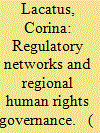

|
|
|
|
|
| Summary/Abstract |
Transnational regional networks of regulatory bodies play a prominent role in complex systems of human rights governance. Despite their growing importance, we still have much to learn about the roles regional networks play as regulatory stewards in the field of human rights. I draw on the literature about regulatory stewardship to analyse a recently formalised regulatory network operating in Europe – the European Network of National Human Rights Institutions. The analysis proposes a model of global governance for human rights that includes networks of national human rights institutions as intermediaries. Moreover, it draws on some of the main concepts of network analysis to assesses the European network’s development into a ‘network administrative organisation’ and applies the model of regulatory stewardship to analyse the institutional network’s use of hierarchical and managerial stewardship to: support its member institutions; stimulate intra-network communication and learning; gain access to international networks; and to shape the regional human rights agenda.
|
|
|
|
|
|
|
|
|
|
|
|
|
|
|
|
| 7 |
ID:
185160


|
|
|
|
|
| Summary/Abstract |
This article deals with state stigmas in the international arena, and addresses the question: why do state-stigmas develop and become sustained in some cases, whereas in other cases they wither away? For parsimonious, analytical purposes we view the process of state stigmatisation through two, interrelated stages: the stigma’s development – where transnational civil society activists and the engagement of mainstream international media play an important role; and the stigma’s sustenance where these elements are joined by the target state’s coping strategy. For theoretical consistency, we limit ourselves to exploring states that are (a) involved in conflicts and (b) aspiring to be part of the Western-led ‘club’ of states. Through the analysis of press articles and UN documents relating to two vastly different case studies: South Africa (1985–1994) and Israel (2000–2019), we demonstrate that states in conflictual situations have limited manoeuvring space in dealing with their developing stigmas; and that the choice of tools utilized in the implementation of the same coping strategy can lead to different results.
|
|
|
|
|
|
|
|
|
|
|
|
|
|
|
|
| 8 |
ID:
185162
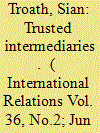

|
|
|
|
|
| Summary/Abstract |
Studying trust at the international level is one of the greatest challenges for trust studies. In this article I seek to expand on work which has sought to study trust between states in a way which avoids anthropomorphising the state, and retains the salience of interpersonal trust. To do this, I consider trust between states as existing in a web of relationships, from relationships between government figures, to military personnel, to members of society. In this article I demonstrate the value of incorporating actors beyond leaders in the most minimal sense: through including boundary spanners, those whose relationships and interactions span across boundaries, whether those boundaries be state borders or segments of government and society. Furthermore, I seek to begin a process of categorising the types of roles that boundary spanners can play in the development of trust between states. To illustrate their impact, I deploy a multidimensional approach to trust which is used to assess the relationship between leaders, and the impact of intermediary figures on both trust between the leaders, and in the relationships developed between the intermediary and their respective leader. One case study is used to exemplify the utility of this approach: the relationship between Harold Macmillan and John F. Kennedy and their respective official ambassadors David Ormsby-Gore and David Bruce.
|
|
|
|
|
|
|
|
|
|
|
|
|
|
|
|
|
|
|
|
|